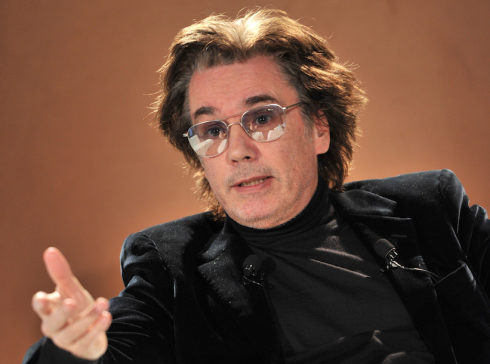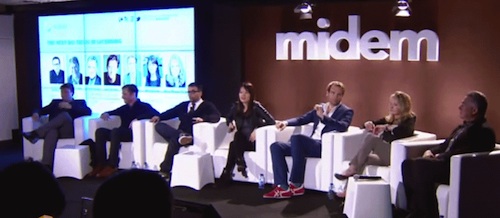

French recording artist Jean Michel Jarre at MIDEM
MIDEM Feb. 3 and 4, 2014
Was this the last MIDEM? That was a rumor rolling around Cannes this year, but longtime attendee John Singleton said that rumor goes around every year.
Attendance is down from ten years ago; the event is not crowded. Old timers complain that it’s not about the music anymore. In a class I teach at Belmont, “History of the Recording Industry,” I tell students that the music business is music, business and technology all rolled together, and that, at any given time, one of those is in the lead. It’s easy—and cool—to say, “It’s the music, man” and that is certainly true in the long haul. You may love Bing Crosby or Elvis or the Beatles and not be aware of the business or technology issues during their time.
At the start of the recording industry, the technology came first; the phonograph had to be invented, then the microphone, and then there had to be improvements in the equipment. Business came second because the industry had to figure out how to set up a profitable business foundation and structure or else the music would not survive. The music, though vitally important, came third. We have the same situation today; technology is in the lead and business has to figure out how to “monetize” (that’s a favorite word at music business conferences) the recordings.
Longtime attendees to MIDEM complain that it is more of a technology convention than a music convention and that the tech folks really don’t care about music. They only want to use it to enhance their technology. The fact is that MIDEM is, to a large degree, now a technology conference. There are seminars about social networking, streaming, and other issues connected to technology. There are “hack days” where people compete for the best app. People are trying to find ways to monetize the exposure they receive from digital technology. So the music comes third.
The other issue that arises is the need to have MIDEM. I remember going into my office at 6 a.m. to make phone calls to London, now I send an email and the next day there’s an answer waiting. Long distance calls were incredibly expensive; today phone rates are cheap. Because of technology, people are in constant contact; in the old days, a letter took quite a while.
MIDEM used to be a place where you received distribution into other countries for your product. Today iTunes and streaming services are in a number of countries, while Facebook and YouTube cover a lot of the world.
Face to face contact is important; technology will never replace a handshake and eye to eye conversation. However the cost of doing business in money and time seems to indicate that technology is rendering conventions like this much less important than they used to be. The fact is that an international convention for people involved in the music industry is vitally important; the question: Is it MIDEM?
• • •
A special presentation from Europeans on “Authors’ Rights: What’s Next on the Agenda” opened Day Three (Feb. 3) at MIDEM. Collection societies led the discussion about “proper remuneration” for writers and it was noted several times that “there’s no quick fix solution—everything is connected to everything.” There was also the observation that “the creative society is looked down on by Brussels and Washington.”
Jean Michel Jarre, a well-known French recording artist and President of France’s CISAC, stated that in terms of getting paid, “We’ve fought the wrong battles. We wanted to get the consumers to pay. When we listened to radio, the rights were collected upstream. Now, we must do the same thing with the internet. The rights must be paid upstream. We need to make agreements with internet companies to get payments upstream.”
In a separate event, Jarre was interviewed by Music Week’s Rhian Jones on the topic, “Fair Share for Creators,” although he said a better title for the talk would be “How to create a sustainable future for the creative community.”
Jarre said, “Royalties have increased to almost 1 billion euros this year, but the bad news is that only four percent came from digital. If digital is the future, what could it be if it was 50-50? In the future, we might have 96 percent digital. We need to send a clear message to these people.”
The artist, who was recently in Los Angeles recording, said, “I have been impressed with how American musicians and filmmakers are watching Europe. We have protected author’s rights. We have increased the VAT (Value Added Tax) in France. Now, it is 5.5 percent for books, 7.55 percent for films, but for music it went from 19.6 to 20 percent. It is intellectual racism. The ticket for a film isn’t that different from a ticket to a music concert. France is good at protecting films and books, but not music.”
Jarre noted, “We need to stop thinking people with the internet are our enemies. Facebook and Google are closer to music than most politicians. We need the internet, but the internet needs us because music will exist long after the internet. Without our content they wouldn’t be able to sell advertising. The music industry has lost its voice. In the ‘60s the music industry did protest songs. We should be protesting now. We were rebels and we’re still rebels. We’re cool and we shouldn’t let the internet companies be cool by using our music and not giving us fair compensation.”
• • •
“The Next Big Thing is Licensing,” featured host Bill Wilson with the Music Business Association (formerly known as NARM, USA) and panelists Charles Caldas, Merlin (Netherlands); Richard Conlon, BMI (USA); Josh Deutsch, Downtown Records (USA); Florian Drucke, BVMI/IFPI (Germany); Melinda Lee, Getty Images Music (USA) and Mary Megan Peer with peermusic (USA).
Conlon stated that licensing is difficult “because there’s a couple of layers. It’s complicated because everyone is a creator now.” Melinda Lee echoed that statement, “Getting the rights to pair a song with a picture is so complicated.”
The remix culture is growing and artists don’t care about getting a record deal; they are getting endorsements and gigs. Mary Megan Peer stated, “We love the remix culture because it gives life to old songs. We just want them to license the songs. It is incumbent on us to make it easy for providers or users pay for music license rights.”
Wilson noted, “There is a format shift from what people were buying to what people are listening to. We must have faith in the power of evolution.”

“The Next Big Thing is Licensing” panel.
• • •
Marcus Taylor, Director of Venture Harbour (U.K.), presented a study on “Creating Sharable Content in the Music Industry” which addressed the problem of finding an audience for content.
Taylor noted that every day there are two million blogs posted, 864,000 hours of video posted on YouTube, and 532 million Facebook status updates. So how does something go viral? “Viral is something that happens; it is not created,” said Taylor.
It comes from sharing, but what makes us share? Taylor said there are two reasons we share: (1) self interest and (2) altruism. Our self interest includes nurturing relationships, defining ourselves and promoting our agendas. Altruism means sharing our experiences and knowledge to help others.
So what do we share? According to Taylor, we share “things that are remarkable” because “remarkable things get remarked on.” We share things when triggered, things that are emotionally stimulating (negative feelings and anger are the tops here), we share things of practical value (useful information), and we share “what others are sharing.”
In terms of the music industry, information about royalties, income, sales figures and challenges are extremely shareable. Data driven content is also shareable “because in a world of sharing opinions, data stands out.”
Facebook is the most important social network for sharing in the music industry, according to Taylor, with 62 percent of all share on the music industry made on Facebook. He also pointed out that 55 percent of social traffic to music content comes through Facebook; however, Twitter has the highest number of visits.
In order to “create contagious content” you must “out-think your competition,” said Taylor. Content is contagious “when it stands out from the crowd, is emotionally stimulating, and is remarkable.”
• • •
A seminar on “Getting International With Big Data: The New Eldorado” was hosted by Ken Hertz, cofounder and principal of memBrain LLC (USA); with panelists Ime Archibong, Facebook (USA); Scott Cohen, The Orchard (UK); Gregory Mead, CEO musicmetric (UK); and Christophe Waignier, SACEM (France).
Ime Archibong with Facebook noted that “Facebook and data are synonymous,” adding that “750 million people touch digital devices on a daily basis.” Scott Cohen from The Orchard noted about data that “It’s the analytics around data that are important: who is using it, when and where are they using it, and why are they using it.”
Ken Hertz stated, “There’s good news and bad news about digital data. On one hand, data is the greatest thing for the music business. On the other, it is possibly the worst thing that could happen to people who lived in the music business. The music industry now is bigger than it ever was but the major players are smaller now than they ever were.”
Archibong with Facebook noted, “Music continues to be something that reverberates. Music is a conversation starter in the Facebook ecosystem.” An audience member asked Archibong, “Why isn’t Facebook paying for content?” Archlibong answered, “We believe we are providing transactional value and promotional value. Facebook makes marketing more personal, which helps the artist.”
“Consumers want to discover the next favorite band,” said Hertz. “And maybe data can get them that.”
Cohen countered, “I don’t think discover is the question—they’ve already got lots of music. From the end user, they just want the things they want and that is often bands they’ve already discovered. The problem with data is that it is backward; it’s what has happened… We need to cross into the 3.1 world. That’s where the gap is: What’s next?” He added, “The data you collect from music will be more valuable over time.”
Hertz noted, “Companies use music to sell something and, ultimately, it’s about figuring out what you sell to whom, so data is an opportunity to learn more. Who is taking data and giving back useful information or using it to build a business? The record industry hasn’t done a good job with research or doing something intelligent with data.” He noted that data isn’t very helpful in predicting success because “in the recording industry it’s nearly impossible for someone to succeed. It’s like winning the lottery.”
In a seminar titled “Developers Are the New Rock Stars,” a participant observed that “Brands have customers but want fans, while musicians have fans but want customers.” This means that the future of music is tied strongly to brands, who will pay for the “cool” factor to reach their customers and increase their business while music will see a major revenue stream through their connection to brands.

Category: Featured, Sales/Marketing
About the Author
Don Cusic is Professor of Music Business at Belmont University. He has authored 18 books, including his most recent “Discovering Country Music.”View Author Profile


